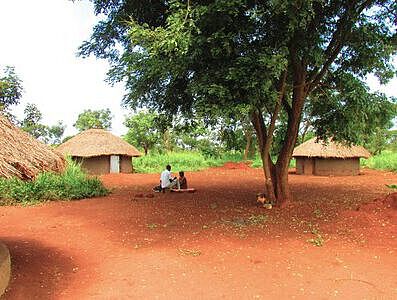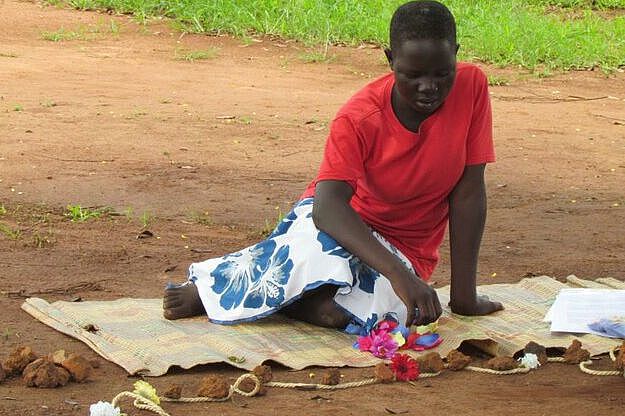
AG Molekulare Psychotraumatologie / AG Förderung ganzheitlicher Gesundheit nach chronischem Stress und Trauma
Projekt: Ätiologie, Symptomatologie und Therapie der Posttraumatischen Belastungsstörung bei Überlebenden des Bürgerkriegs in Uganda

Projektleitung und Team
Projektleitung
Prof. Dr. Iris-Tatjana Kolassa
Team
M.Sc. Anna Schneider
Anett Pfeiffer (vivo Uganda)
Kooperationspartner
Dr. Sarah Wilker, Universität Bielefeld
Ansprechpartnerin
✉ Prof. Dr. Iris-Tatjana Kolassa
Forschungsfragen und zentrale Ergebnisse
In Kooperation mit der vivo outpatient clinic for survivors of violence and trauma in Gulu, Norduganda untersuchten wir:
- Evaluation der Quantifizierung und Untersuchung des Einflusses von Trauma-Exposition als Umwelt-Risiko-Faktor bei der Entstehung und Therapie von Posttraumatischer Belastungsstörung
- Identifikation von genetischen und epigenetischen Einflussfaktoren auf die Entstehung einer Posttraumatischen Belastungsstörung
- Identifikation von genetischen und epigenetischen Einflussfaktoren auf den Therapieerfolg von Posttraumatischer Belastungsstörung mit Trauma-fokussierter Expositionstherapie (Narrative Expositionstherapie)
- Biologische Korrelate des Therapieerfolges Trauma-fokussierter Expositionstherapie (Narrative Expositionstherapie)


Drittmittel und Kooperationspartner
Förderung im Rahmen des D-A-CH Programms der Deutschen Forschungsgemeinschaft (DFG) in Kooperation mit der Swiss National Science Foundation (SNF)
Das Projekt wurde in Zusammenarbeit mit folgenden Institutionen realisiert:
- Universität Basel, Fakultät für Psychologie, Abteilung für Molekulare Neurowissenschaften (Prof. Dr. Andreas Papassotiropoulos) und Abteilung für Kognitive Neurowissenschaften (Prof. Dr. Dominique de Quervain)
- Universität Konstanz, Fachbereich Psychologie, Lehrstuhl Klinische Psychologie und Klinische Neuropsychologie (Prof. Dr. Thomas Elbert)
- vivo outpatient clinic for survivors of violence and trauma, Gulu, Norduganda, www.vivo.org
Preise und Auszeichnungen
- Sarah Wilker: 2017 Promotionspreis der Ulmer Universitätsgesellschaft
- Sarah Wilker: DeGPT-Förderpreis der Falk-von-Reichenbach-Stiftung 2015
- Sarah Wilker: Finalistin des Engagementpreises der Studienstiftung des deutschen Volkes „Weiter?Geben“
Publikationen
- Conrad, D., Wilker, S., Schneider, A., Karabatsiakis, A., Pfeiffer, A., Kolassa, S., … Kolassa, I.-T. (2018). Integrated genetic, epigenetic, and gene set enrichment analyses identify NOTCH as a potential mediator for PTSD risk after trauma: Results from two independent African cohorts. Psychophysiology, e13288. doi: 10.1111/psyp.13288. [pdf]
- Conrad, D., Wilker, S., Pfeiffer, A., Lingenfelder, B., Ebalu, T., Elbert, T., Kolassa, I.-T., Kolassa,S. (2017) Does trauma event type matter in the assessment of traumatic load? European Journal of Psychotraumatology, 8(1), 1344079. [pdf]
- Heck, A., Milnik, A., Vukojevic, V., Petrovska, J., Egli, T., Singer, J., Escobar, P., Sengstag, T., Coynel, D., Freytag, V., Fastenrath, M., Demougin, P., Loos, E., Hartmann, F., Schicktanz, N., Delarue Bizzini, B., Vogler, C., Kolassa, I.-T., Wilker, S., Elbert, T., Schwede, T., Beisel, C., Beerenwinkel, N., de Quervain, D.J.-F., Papassotiropoulos, A. (2017). Exome sequencing of healthy phenotypic extremes links TROVE2 to emotional memory and PTSD. Nature Human Behaviour, 1(4), s41562-017, doi: 10.1038/s41562-017-0081.
- Wilker, S., Pfeiffer, A., Elbert, T., Ovuga, E., Karabatsiakis, A., Schelling, G. & Kolassa, I.-T. (2016). Endocannabinoid concentrations in hair are related to posttraumatic stress disorder symptom severity. Psychoneuroendocrinology, 67, 198-206. [pdf]
- Karabatsiakis, A., Hamuni, G., Wilker, S., Kolassa, S., Renu, D., Kadereit, S., Schauer, M, Hennessy, T., & Kolassa, I.-T. (2015). Metabolite profiling in posttraumatic stress disorder. Journal of Molecular Psychiatry, 3(2), doi: 10.1186/s40303-015-0007-3.
- Wilker, S., Pfeiffer, A., Kolassa, S., Koslowski, D., Elbert, T., & Kolassa, I-T. (2015). How to quantify exposure to traumatic stress? - Reliability and validity of measures for cumulative trauma exposure in a post-conflict population. European Journal of Psychotraumatology, 6: 28306, doi: 10.3402/ejpt.v6.28306.
- Vukojevic, V., Kolassa, I-T., Fastenrath, M. ,Gschwind, L., Spalek, K., Milnik, A., Heck, A., Vogler, C., Wilker, S., Demougin, P., Peter, F., Atucha, E., Stetak, A. Roozendaal, B., Elbert, T., Papassotiropoulos, A. & de Quervain, D. (2014). Epigenetic modification of the glucocorticoid receptor gene is linked to traumatic memories and PTSD risk in genocide survivors. Journal of Neuroscience, 34(31), 10274-10284. [pdf]
- Wilker, S., Pfeiffer, A., Kolassa, S., Elbert, T., Lingenfelder, B., Ovuga, E., Papassotiropoulos, A., de Quervain, D., & Kolassa I.-T. (2014). The role of FKBP5 genotype in moderating long-term effectiveness of exposure-based psychotherapy for posttraumatic stress disorder. Translational Psychiatry, 4:e403, doi: 10.1038/tp.2014.49.
- Wilker, S., Elbert, T., Papassotiropoulos, A., de Quervain, D. J.-F., Kolassa, I.-T. (2014). Response to: further support for an association between the memory-related gene WWC1 and posttraumatic stress disorder: results from the Detroit Neighborhood Health Study. Biological Psychiatry, 76(11), 27-28. [pdf]
- Wilker, S., Elbert, T., & Kolassa, I.-T. (2014). The downside of strong emotional memories: How human memory-related genes influence the risk for posttraumatic stress disorder – a selective review. Neurobiology of Learning and Memory, 112, 75-86. [pdf]
- Papassotiropoulos, A., Gerhards, C., Heck, A., Ackermann, S., Aerni, A., Demougin, P., Elbert, T., Ertl, V., Gschwind, L., Hanser, E., Huynh, K.-D., Jessen, F., Kolassa, I.-T., Muhs, A., Paganetti, P., Spalek, K., Vogler, C., Pfeifer, A., de Quervain, D. (2013). Human genome-guided identification of memory-modulating drugs. PNAS, 110(46):e4369-74. [pdf]
- Wilker, S., Kolassa, S., Vogler, C., Lingenfelder, B., Elbert, T., Papassotiropoulos, A., De Quervain, D. J.-F., Kolassa, I.-T. (2013). The Role of Memory-related Gene WWC1 (KIBRA) in Lifetime Posttraumatic Stress Disorder: Evidence from Two Independent Samples from African Conflict Regions. Biological Psychiatry, 74(9):664-671 [pdf]
- Wilker, S. & Kolassa, I.-T. (2013). The formation of a neural fear network in Posttraumatic Stress Disorder: Insights from molecular genetics. Clinical Psychological Science, 1(4), 452-469. [pdf]
- de Quervain, D. J.-F., Kolassa, I.-T., Ackermann, S., Aerni, A., Boesiger, P., Demougin, P., Elbert, T., Ertl, V., Gschwind, L., Hadziselimovic, N.,Hanser, E., Heck, E., Hieber, P., Huynh, K.-D., Klarhöfer, M., Luechinger, R., Rasch, B., Scheffler, K., Spalek, K., Stippich, C., Vogler, C., Vukojevic, V., Stetak, A. Papassotiropoulos, A.(2012). PKCα is genetically linked to emotional memory in healthy Europeans and to the risk for PTSD in heavily traumatized Rwandese. PNAS, 109(22):8746-51. [pdf]
- Kolassa, I.-T., Ertl., V., Eckart, C., Thurm, F., Kolassa, S., Papassotiropoulos, A., de Quervain, D. J.-F., Elbert, T. (2010). Association study of trauma load and SLC6A4 promoter polymorphism in PTSD: evidence from survivors of the Rwandan genocide. Journal of Clinical Psychiatry, 71(5):543-547. [pdf]
- Kolassa, I.-T., Kolassa, S., Ertl, V., Papassotiropoulos, A., & de Quervain, D. J.-F. (2010). The risk of Posttraumatic Stress Disorder after trauma depends on trauma load and the COMT Val158Met polymorphism. Biological Psychiatry, 67(4), 304-308. [pdf]
- de Quervain, D. J.-F., Kolassa, I.-T., Ertl, V. Onyut, P. L., Neuner, F., Elbert, T., & Papassotiropoulos, A. (2007). A deletion variant of the α2b-adrenoceptor is related to emotional memory in Europeans and Africans. Nature Neuroscience, 10(9), 1137-1139. [pdf]
